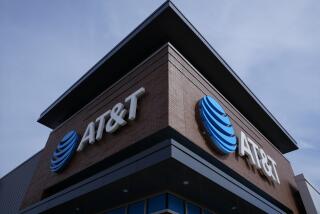Sprint is throttling Microsoft’s Skype service, study says

Sprint Corp. has been slowing traffic to Microsoft Corp.’s internet-based video chat service Skype, according to new findings from an ongoing study by Northeastern University and the University of Massachusetts.
More than 100,000 consumers have used the researchers’ Wehe smartphone app to test internet connections. Information from those tests is aggregated and analyzed by the researchers to check if data speeds are being slowed, or throttled, for specific mobile services.
Among leading U.S. carriers, Sprint was the only one to throttle Skype, the study found. The throttling was detected in 34% of 1,968 full tests — defined as those in which a user ran two tests in a row — conducted between Jan. 18 and Oct. 15. It happened regularly and was spread geographically across the United States. Android phone users were more affected than owners of Apple Inc.’s iPhones.
“In the case of a video call, which is what we were testing, the video quality would be much poorer — poorer than what the network supports,” said David Choffnes, one of the researchers who developed the Wehe app.
The finding is particularly troubling because Skype relies on Sprint’s wireless internet network, but the app also provides a communication tool that competes with Sprint’s calling services, the researcher added.
“If you are a telephony provider and you provide IP services over that network, then you shouldn’t be able to limit the service offered by another telephony provider that runs over the internet,” Choffnes said. “From a pure common sense competition view, it seems directly anti-competitive.”
Slowing speeds can reduce bottlenecks and congestion, but it raises questions about whether all internet traffic is treated equally, a prime tenet of net neutrality. The principle states that carriers should not discriminate by user, app or content. The Federal Communications Commission enshrined net-neutrality rules in 2015, but after President Trump took office last year, a Republican-led FCC scrapped the regulations.
Sprint spokeswoman Lisa Dimino said her company doesn’t “single out Skype or any individual content provider in this way.” Microsoft declined to comment.
The researchers bought a Sprint wireless plan to try to detect throttling of Skype in the lab, but they couldn’t replicate the experience of the Wehe app users. They said that was probably because it affects only certain subscription plans, not the one they bought.
Choffnes became an internet celebrity in December, when Apple rejected the Wehe app from the App Store. After an outcry, Apple approved and published the app. Wehe had only a handful of users before the episode, but it quickly gained tens of thousands of new testers.
This year, Choffnes and his fellow researchers found that the largest U.S. telecom companies were throttling popular apps including Netflix and Google’s YouTube. Both studies look for “differentiation,” when a type of traffic on a network is treated differently from other types of traffic. Most of this activity is throttling.
Choffnes’ work is funded by the National Science Foundation, Google parent Alphabet Inc. and ARCEP, the French telecom regulator. Amazon.com Inc. provided some free services, and Choffnes has been asked by Verizon Communications Inc. to measure throttling across all carriers.






